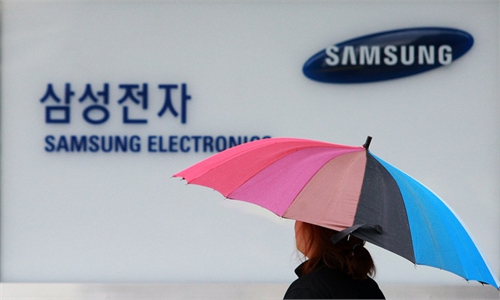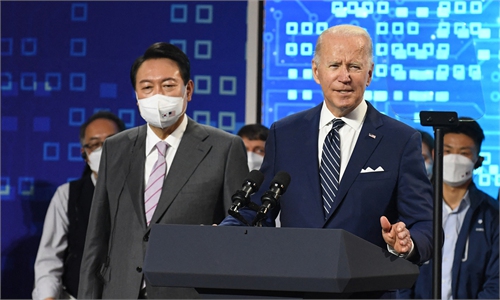
Illustration: Chen Xia/Global Times
South Korea's Samsung Electronics on Thursday named Jay Y. Lee as its executive chairman. The new appointment comes as the company faces mounting challenges due to a global economic downturn and growing geopolitical risks posed by the US, which has been effectively forcing South Korea's and other countries' tech firms to decouple with China and invest in the US.As Lee, who has been vice chairman of Samsung Electronics since 2012, officially took charge on Thursday, the technology giant reported a 31 percent drop in third-quarter profit and "geopolitical uncertainties were likely to dampen demand until early 2023," according to Reuters.
Obviously, Lee faces many daunting tasks ahead, including boosting the company's sales and bolstering its innovation capabilities to retain a competitive edge. Still, one of the thorniest decisions he will have to make is how to respond to growing US pressure on the company to "abandon" the Chinese market and invest in the US. Many media outlets have repeatedly mentioned a high-profile visit by Lee to the US last year, during which he was expected to discuss a huge foundry plant in the US. Yet, as a long-time executive of Samsung, Lee should know firsthand the importance of the Chinese market to the company's business operations.
One thing is clear: the US will not stop its pressuring campaign on Samsung and other global chip giants. Also clear is that from coercing South Korea to join the "Chip 4" Alliance to the recently introduced "Inflation Reduction Act" and "CHIPS and Science Act," the fundamental purpose of the US is to strengthen its domestic chip manufacturing, disrupt and destroy the Asian chip industry chain, and thereby exclude China from the industrial chain. The US will only consider its own interests, and will never be soft on others including allies like South Korea.
For instance, after the US passed the "Inflation Reduction Act," South Korea expressed dissatisfaction in order to mitigate the sudden impact on its car companies, and said it would consider filing a lawsuit with the WTO against the US legislation if necessary. Under the pressure of many parties, Samsung should insist on increasing investment in scientific research, improving technology, grasping the market and safeguarding its current market share. That means it is of great significance for Samsung to manage its business in China in the right way.
The importance of the Chinese market to Samsung is self-evident. Even as Samsung's share in the Chinese smartphone market has dropped to less than 1 percent since 2019 from a 20-percent high in 2013, according to research firm Counterpoint, China remains the largest market for Samsung Electronics, accounting for around 30 percent of the tech giant's overall sales, South Korean media outlet Yonhap News Agency reported last December.
Many moves of the company show that it attaches great importance to the Chinese market. In addition to launching a special team to boost sales in China, the company continues expanding investment and production in China despite US blockade.
Shortly after the US brought up the so-called "Chip 4" semiconductors alliance, which is widely seen as a geopolitical gambit attempting to disrupt regional industrial chain, Samsung's NAND flash plant in Xi'an, Northwest China's Shaanxi Province, Samsung's only overseas memory semiconductor plant, completed the expansion of its second plant and started its full-scale production, Business Korea reported in April.
In contrast to the US' protectionist moves, China has been expanding its opening-up and improving the business environment for foreign businesses, which has shown great results in terms of foreign investments. In spite of global economic woes, foreign direct investment (FDI) into the Chinese mainland, in actual use, expanded 16.4 percent year-on-year to 892.74 billion yuan in the first eight months of the year, data from the Ministry of Commerce showed.
China welcomes foreign businesses, including Samsung, to expand investment in the country, while firmly opposing the US' crackdown moves. And it is hoped that foreign businesses such as Samsung can grasp the development opportunities in the Chinese market and achieve win-win results.
Speaking of the US' intensified export controls on semiconductors and other fields to China, the Chinese Ambassador to South Korea said what the US has done threatens the integrity of the global production and supply chain and harms the common interests of all parties, including many South Korean businesses, according to a transcript published on the embassy's site on Thursday.
China is willing to continuously deepen mutually beneficial and pragmatic cooperation with the South Korean side to jointly maintain the security, stability and smoothness of production and supply chains in the two countries, the ambassador noted.
The author is a reporter with the Global Times. bizopinion@globaltimes.com.cn


